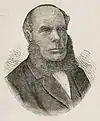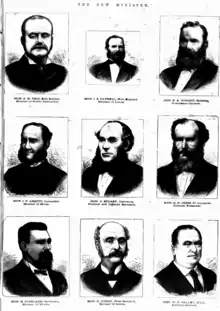Stuart ministry | |
|---|---|
| 20th Cabinet of the Colony of New South Wales | |
  Premier Alexander Stuart and the Colony of New South Wales (1863–1900) | |
| Date formed | 5 January 1883 |
| Date dissolved | 6 October 1885 |
| People and organisations | |
| Monarch | Queen Victoria |
| Governor | Lord Augustus Loftus |
| Head of government | Alexander Stuart |
| No. of ministers | 10 |
| Member party | unaligned |
| Status in legislature | Minority government |
| Opposition party | unaligned |
| Opposition leader | Henry Parkes |
| History | |
| Predecessor | Third Parkes ministry |
| Successor | First Dibbs ministry |
The Stuart ministry was the 20th ministry of the Colony of New South Wales, and was led by Sir Alexander Stuart. Stuart was elected to the New South Wales Legislative Assembly in 1874.
The title of Premier was widely used to refer to the Leader of Government, but not enshrined in formal use until 1920.
There was no party system in New South Wales politics until 1887.[1] Under the constitution, ministers in the Legislative Assembly were required to resign to recontest their seats in a by-election when appointed.[2] Such ministerial by-elections were usually uncontested and on this occasion a poll was required for East Sydney where George Reid was easily re-elected and Newtown where Henry Copeland was narrowly defeated. Copeland was able to return to the assembly the following week due to a vacancy at East Sydney. The 6 other ministers, Sir Alexander Stuart (Illawarra), George Dibbs (St Leonards), Henry Cohen (West Maitland), James Farnell (New England), Francis Wright (Redfern) and Joseph Abbott (Gunnedah ), were re-elected unopposed. The minister subsequently appointed, William Trickett (Paddington) was also re-elected unopposed.[3]
In January 1884 the Committee of Elections and Qualifications held that an error in the drafting of the constitution meant that George Reid could not be validly appointed Minister of Public Instruction, and declared his seat vacant.[4] Reid was defeated in the resulting by-election in February 1884.[3]
This ministry covers the period from 5 January 1883 until 6 October 1885. Suffering a paralytic stroke whilst in office, William Dalley was acting Premier from late 1884, with Dalley deciding to send a contingent of troops to the Sudan. Stuart resumed his duties in May 1885 before resigning in October due to continued ill health. His Treasurer, George Dibbs, succeeded Stuart as Premier.[5][6][7]

Composition of ministry
| Portfolio | Minister | Term start | Term end | Term length |
|---|---|---|---|---|
| Premier Colonial Secretary |
Sir Alexander Stuart [lower-alpha 1] | 5 January 1883 | 6 October 1885 | 2 years, 274 days |
| Colonial Treasurer | George Dibbs | |||
| Minister of Public Instruction | George Reid | 6 March 1884 | 1 year, 61 days | |
| William Trickett | 2 May 1884 | 6 October 1885 | 1 year, 157 days | |
| Minister of Justice | Henry Cohen | 5 January 1883 | 2 years, 274 days | |
| Attorney General Representative of the Government in Legislative Council |
William Dalley MLC [lower-alpha 1] | |||
| Secretary for Lands | James Farnell | |||
| Secretary for Public Works | Henry Copeland | 28 March 1883 | 82 days | |
| Francis Wright | 28 May 1883 | 6 October 1885 | 862 days | |
| Postmaster-General | 5 January 1883 | 27 May 1883 | 142 days | |
| William Trickett | 28 May 1883 | 1 May 1884 | 339 days | |
| James Norton MLC | 2 May 1884 | 6 October 1885 | 1 year, 157 days | |
| Secretary for Mines | Joseph Abbott | 5 January 1883 | 2 years, 274 days | |
| Vice-President of the Executive Council | Sir Patrick Jennings | 31 July 1883 | 207 days |
Ministers are members of the Legislative Assembly unless otherwise noted.
See also
References
- ↑ Green, Antony (20 October 2010). "Centenary of the First NSW Labor Government". Australian Broadcasting Corporation. Archived from the original on 10 March 2012.
- ↑ Twomey, Anne (2004). The Constitution of New South Wales. Federation Press. pp. 442. ISBN 9781862875166. Retrieved 24 November 2020.
- 1 2 Green, Antony. "By-elections 1882-85". New South Wales Election Results 1856-2007. Parliament of New South Wales. Retrieved 5 March 2021.
- ↑ Twomey (2004), pp. 433–4.
- ↑ Nairn, Bede; Martha Rutledge. "Stuart, Sir Alexander (1824–1886)". Australian Dictionary of Biography. National Centre of Biography, Australian National University. ISSN 1833-7538. Retrieved 6 March 2021.
- ↑ Serle, Percival (1949). "Stuart, Sir Alexander (1824–1886)". Dictionary of Australian Biography. Sydney: Angus & Robertson. Retrieved 6 March 2021.
- ↑ "Part 6 Ministries since 1856" (PDF). NSW Parliamentary Record. Parliament of New South Wales. Retrieved 6 March 2021.